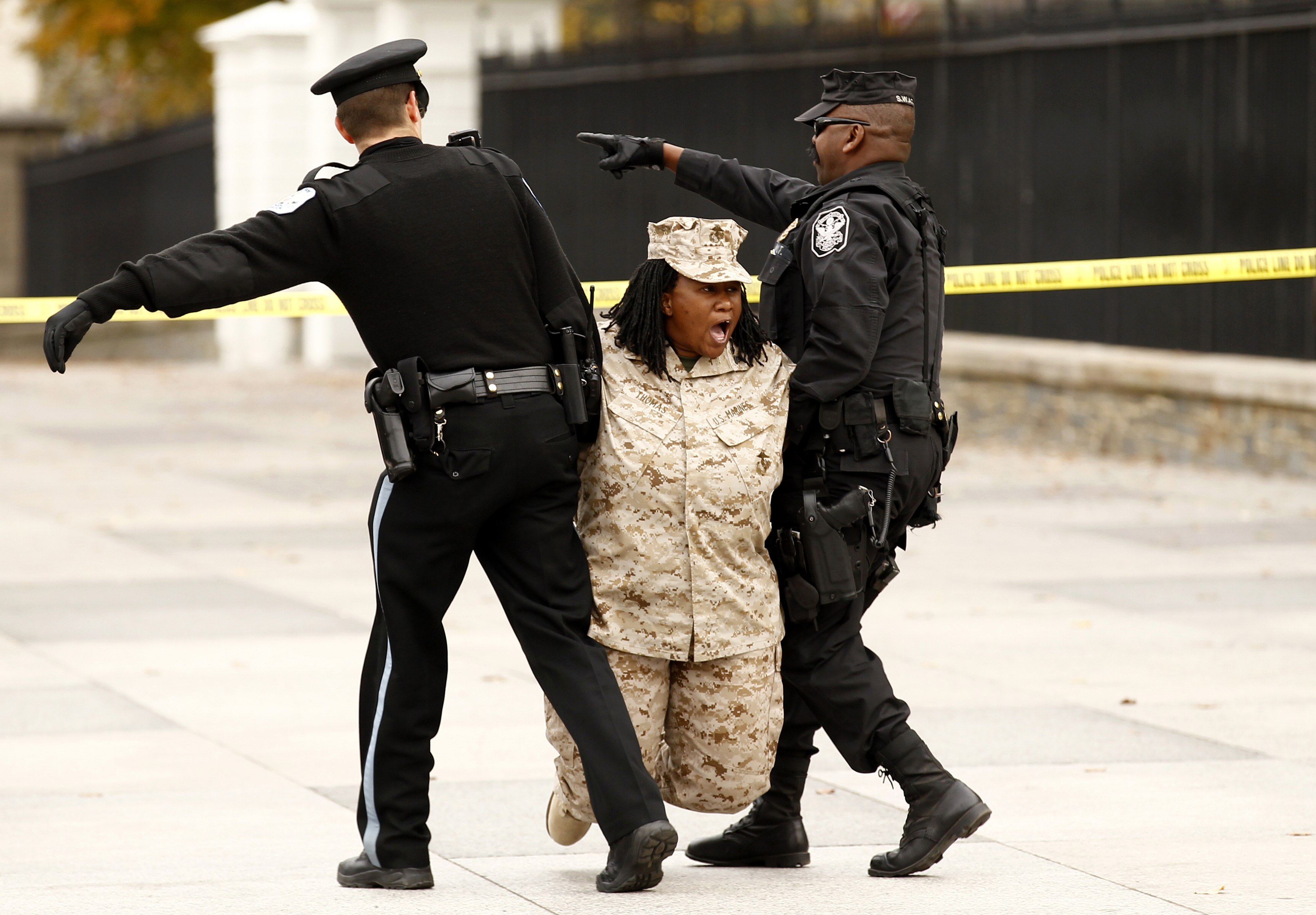Conservatives used to love government coercion — when it helped ban gay marriage
The controversy in Indiana points to a huge logical hole in the conservative worldview


Conservatives are clear on one point these days: Government coercion is bad. So when Sally Kohn at Talking Points Memo wrote an unfortunately muddled post arguing that statutes outlawing discrimination against LGBT people are not inherently coercive, Sean Davis leapt to the attack:
That's how laws — even vile ones like those of the Jim Crow era — work. Blacks didn't choose to use different water fountains or lunch counters. They were forced to do so by police, hoses, and dogs. A law is nothing but a threat backed up by force. This principle is not "ideological," as Kohn tried to suggest on Twitter. It is definitional. The threat of force is what converts a mere recommendation into an actual law. [The Federalist]
On this point, Davis is correct and Kohn is wrong. However, Davis seems blithely unaware of the ideological rake he stomped on in making this argument. For if all laws without exception are coercive, and they most surely are, then the government is unavoidably involved in either preventing or propagating discrimination. The idea that government coercion in itself is bad is blown out of the water — as is half of conservative political argumentation.
What Davis seems to forget is that laws like ObamaCare (which supposedly tramples individual liberty through coercion) or statutes against LGBT discrimination (which supposedly tramples religious freedom through coercion) aren't the only ones on the books. There is also property law, corporate law, securities law, contract law, labor law — the very foundation stones of our economy.
The Week
Escape your echo chamber. Get the facts behind the news, plus analysis from multiple perspectives.

Sign up for The Week's Free Newsletters
From our morning news briefing to a weekly Good News Newsletter, get the best of The Week delivered directly to your inbox.
From our morning news briefing to a weekly Good News Newsletter, get the best of The Week delivered directly to your inbox.
These laws also operate on coercion. If you interfere with someone's property right, by entering his house without his consent, for example, then under the law he can call on public authorities to, at the very least, violently compel you into leaving. He can probably call on them to stuff you into a jail cell and, in some cases, kill you outright. Property, wealth, and corporate structures rest on a premise of violent state coercion — that is to say, law, per Davis.
Coercion is a background condition of all economic activity. That recognition has led past reformers to argue that people and businesses must accept some social responsibilities in return for their guarantee of state protection. If you want the state's help in evicting deadbeat tenants, you must not discriminate against unmarried couples, as the California Supreme Court once decided.
Similarly, an anti-discrimination statute would require businesses to serve LGBT customers to access the state's capacity for violent coercion. Whether such requirements are just depends on their inherent morality, determined by some other means — not on whether they are coercive.
As Robert Hale persuasively argued, coercion simply saturates the economy. The system of property and ownership coerces people into working for wages, because it's either that or deprivation, if not starvation. Workers, either by collective action or their relative scarcity, use what power they have to coerce higher wages from their employer. Consumers can use their power to withhold purchasing to coerce businesses in one way or another, and so on.
A free daily email with the biggest news stories of the day – and the best features from TheWeek.com
At any rate, as Matt Yglesias demonstrated, the moral-political question when it comes to religious discrimination is a fairly tricky one. While I believe most businesses should not be allowed to discriminate, I certainly sympathize with the hapless pizza shop owner who stepped into a massive internet firestorm by saying he wouldn't cater a gay wedding.
But until quite recently, conservatives were huge fans of violent state coercion when it came to LGBT people. During the 2004 election alone, they had gay marriage bans on ballots in 11 states, every one of which passed. George W. Bush wanted to amend the Constitution to prevent same-sex marriages forever. By 2008, all but seven states had gay marriage bans of one kind or another.
This history has suddenly become rather inconvenient. Over at National Review, the new line is that gays and anti-gay marriage people have been "coexisting rather easily in Indiana for a great long while now," omitting the state ban on gay marriage. It's only now that the shoe is on the other foot, and conservatives find themselves on the receiving end of a culture war rout, that state coercion has become this threat to the American way of life.
I'm sure it doesn't feel great — 2004 was no picnic for the lonely gay marriage supporter, even if you lived in Oregon. But it's also true that nobody has a principled anti-coercion stance, because it's not really possible. Most people would like to pin the normatively loaded weight of coercion on the enemy, and demonstrate that their own side is not coercive in the slightest. Either way, it's a crock.
Ryan Cooper is a national correspondent at TheWeek.com. His work has appeared in the Washington Monthly, The New Republic, and the Washington Post.
-
 The week’s best photos
The week’s best photosIn Pictures A fireman's ladder, a race through the desert, and more
-
 NASA discovered 26 microbes in their cleanrooms
NASA discovered 26 microbes in their cleanroomsUnder the radar The bacteria could contaminate space
-
 The elite falcon trade in the Middle East
The elite falcon trade in the Middle EastUnder the Radar Popularity of the birds of prey has been ‘soaring’ despite doubts over the legality of sourcing and concerns for animal welfare
-
 The billionaires’ wealth tax: a catastrophe for California?
The billionaires’ wealth tax: a catastrophe for California?Talking Point Peter Thiel and Larry Page preparing to change state residency
-
 Bari Weiss’ ‘60 Minutes’ scandal is about more than one report
Bari Weiss’ ‘60 Minutes’ scandal is about more than one reportIN THE SPOTLIGHT By blocking an approved segment on a controversial prison holding US deportees in El Salvador, the editor-in-chief of CBS News has become the main story
-
 Has Zohran Mamdani shown the Democrats how to win again?
Has Zohran Mamdani shown the Democrats how to win again?Today’s Big Question New York City mayoral election touted as victory for left-wing populists but moderate centrist wins elsewhere present more complex path for Democratic Party
-
 Millions turn out for anti-Trump ‘No Kings’ rallies
Millions turn out for anti-Trump ‘No Kings’ ralliesSpeed Read An estimated 7 million people participated, 2 million more than at the first ‘No Kings’ protest in June
-
 Ghislaine Maxwell: angling for a Trump pardon
Ghislaine Maxwell: angling for a Trump pardonTalking Point Convicted sex trafficker's testimony could shed new light on president's links to Jeffrey Epstein
-
 The last words and final moments of 40 presidents
The last words and final moments of 40 presidentsThe Explainer Some are eloquent quotes worthy of the holders of the highest office in the nation, and others... aren't
-
 The JFK files: the truth at last?
The JFK files: the truth at last?In The Spotlight More than 64,000 previously classified documents relating the 1963 assassination of John F. Kennedy have been released by the Trump administration
-
 'Seriously, not literally': how should the world take Donald Trump?
'Seriously, not literally': how should the world take Donald Trump?Today's big question White House rhetoric and reality look likely to become increasingly blurred
